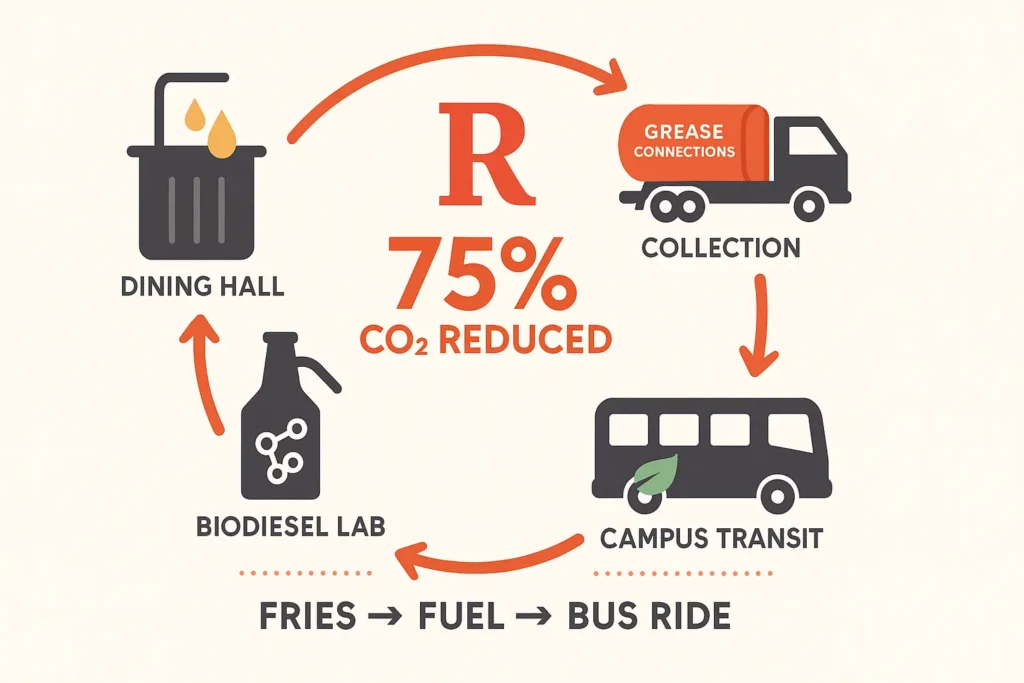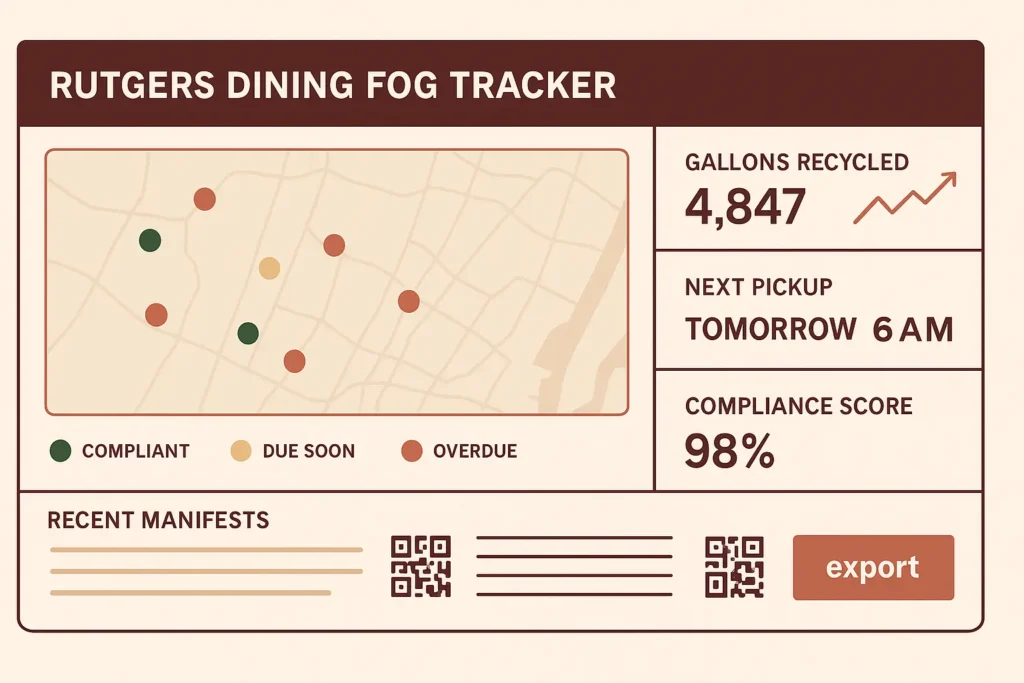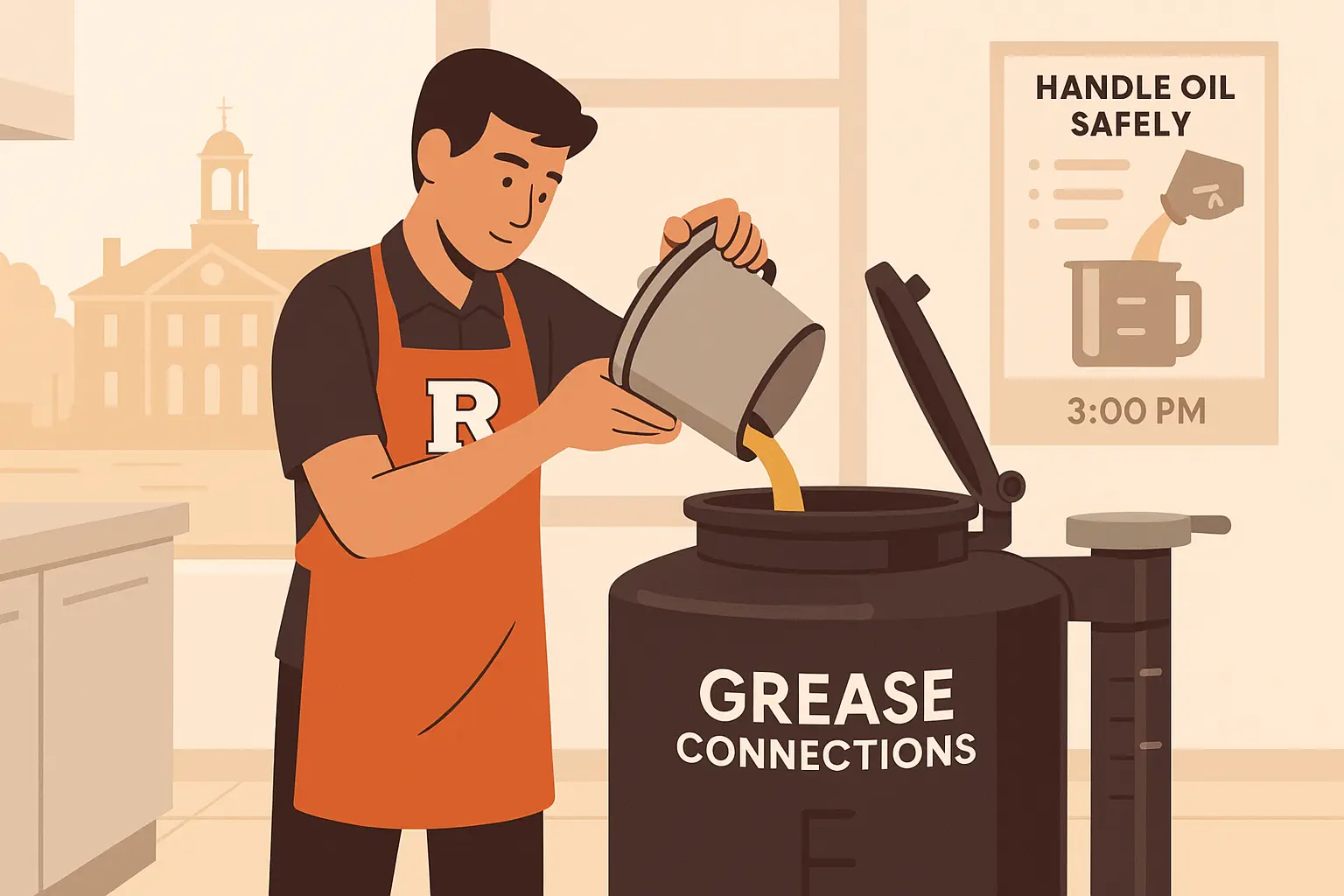Table of Content
Why Grease Compliance Matters to NJ Campuses
Fats, oils & grease clog pipes faster than any other food waste, and New Jersey now fines up to $2,000 per violation under N.J.A.C 8:24 and 7:9A rules. Rutgers’ own Environmental Health & Safety manual calls fryer oil “regulated waste” that must never reach floor drains. Overflowing traps also trigger PVSC penalties of $100 per day once oil exceeds 150 mg/L. By staying ahead of pickups and paperwork, dining services avoid shutdowns, protect campus waterways, and earn cash rebates that fund student programs. Grease Connections’ NJ fleet pays campuses every gallon, turning a compliance cost into a revenue stream.
Crack the Rutgers Grease Trap Rule in 3 Steps
Rutgers kitchens follow the same sizing math most NJ health officers use: one pound of grease capacity for every 1.5 GPM of sink flow. Traps must sit “easily accessible for cleaning,” and records of every pump out stay on site for three years. The simplest workflow: schedule quarterly service, paste the emailed manifest inside the logbook, and upload the PDF to your digital FOG portal. If rinse water ever tests above 100 mg/L oil, bump service to bi monthly until two clean tests pass exactly what PVSC inspectors look for.
The Fryer Oil Lifecycle From Basket to Biodiesel
Every gallon starts at 350 °F but ends as renewable fuel. Student workers pour cooled oil into a locked 140 gal tank; a wireless sensor pings dispatch at 80 % full. A NJDEP licensed truck vacuums the load, weighs it on board, and emails a QR code manifest accepted statewide. That oil reaches regional plants where it’s filtered and trans esterified into biodiesel, cutting CO₂ by up to 75 %. The manifest doubles as proof for campus sustainability reports, satisfying state food waste diversion goals.
Large Volume Oil Rebates: Turn Waste into Budget Relief
High output dining halls can top 1,000 gal/month. At today’s rebate rates, that’s over $4,000 back each semester money many NJ schools roll into meal plan scholarships. Grease Connections deposits quarterly ACH payments with no volume minimums. NJDEP’s Recycling Enhancement Grant lets campuses stack these payments with state incentives targeted at food waste diversion. Keep every manifest in one dashboard and export reports each June to secure next year grants.
Build a Sustainability Fryer Oil Program Students Celebrate
Rowan engineering students proved vegetable oil biodiesel can power campus shuttles after minimal purification. Rutgers’ biomass assessment found used oils among the state’s most promising low carbon feedstocks. Pairing dining services with research labs closes a circular loop students can measure: “Fries → Fuel → Bus Ride.” Public dashboards showing gallons recycled and CO₂ saved boost ESG scores and attract press coverage.

Find the Right Biodiesel Research Partner
Rutgers’ Clean Energy researchers welcome feedstock partnerships that deliver at least 250 gal/week of steady oil for pilot reactors. Agree on ASTM D6751 testing costs up front and publish the results in student media free PR that lifts applications and donations. Rowan’s long running vegetable oil project is another option for South Jersey campuses.
Permits & Paperwork Stay Ahead of NJDEP and PVSC
Campus maintenance teams must list every grease trap and oil tank on the NJPDES Groundwater Master General Permit application. Local sewer authorities such as PVSC require annual self monitoring reports with oil and grease lab data and proof of Best Management Practices. Grease Connections auto files those PDFs after each pickup no spreadsheets, no late night audits.
Tanker Truck Scheduling Without Guesswork
Sensor data sets the route: Rutgers New Brunswick tanks clear twice a week; quieter satellite cafés go monthly. Missed pickups invite odor complaints and fire citations, so Grease Connections offers a 15 minute punctuality credit that actually raises your rebate when we’re late an incentive no out of state carrier matches.
| NJ City | Typical Campus Stop | Standard Pickup Window |
|---|---|---|
| Newark | Rutgers Newark | Tue/Fri 4 to 7 a.m. |
| New Brunswick | Rutgers NB | Mon/Thu 5 to 8 a.m. |
| Glassboro | Rowan University | Wed 6 to 9 a.m. |
| Jersey City | Hudson County CC | Thu 4 to 7 a.m. |
Stop Dining Hall Grease Theft Before It Starts
Stolen oil cost one NJ restaurant chain $30,000 last year; police traced the crime to an unmarked tank truck. Thieves now drill pencil size holes and siphon overnight. Install tamper tags, motion lights, and GPS locked lids standard on every Grease Connections container to deter hits and capture time stamped evidence for insurers.
FOG Data Tracking that Makes Audits a One Click Job
Modern compliance software like SwiftComply lets universities auto ingest pump out logs, trigger reminder emails, and surface non compliant cafés on a color coded map. Combined with Grease Connections’ QR code manifests, staff can export an entire year of records in under five minutes exactly what NJDEP inspectors want during surprise visits.

Put New Jersey’s Biggest Cities on Your Sustainability Map
Newark, Jersey City, and Paterson alone serve more than 758,000 meals daily. Recycling fryer oil from those hubs into biodiesel saves an estimated 3,500 tons of CO₂ each year, enough to offset every Rutgers football away game bus trip. Link this page to each city’s service area guide so facilities teams find local pickup times, permits, and rebate calculators fast.
Next Step
Grease Connections advises every New Jersey university to book a free on site grease audit this semester. Our team sizes traps, installs sensors, and delivers a written compliance plan in 48 hours so you can keep feeding students and forget about fines.
Need help right now? Call our 24/7 compliance line at (888) 826‑0201.









